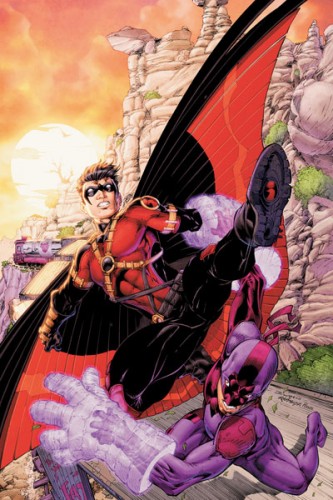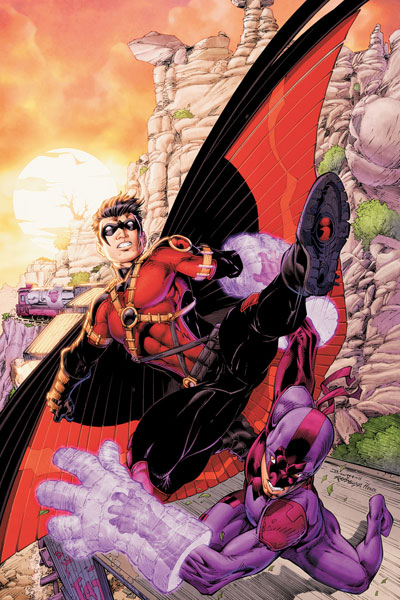Boom! Wham! Pow! The ComiQuad is a brand new column dedicated to the spandex-laden world of comics and superheroes. It goes up each Tuesday and will alternate between comic book reviews and other comic book news. Reviews shall try to be spoiler-free. Zam!
Earlier today, like most college students tend to do during class, I was bumbling along in the land of Tumblr. I was scanning through the various images, memes, and blog posts when I stumbled upon a question that caught my eye. On Gail Simone’s Tumblr account, a fan asked her the following question:
“cobblepot asked: Hello Gail! I’m not sure if you have been asked this before (you probably have, and have responded to it, but I couldn’t see anything on your tumblr), but I was wondering, what are your thoughts/views on the way the character Bunker is being handled? I know that Lobdell said he wanted the character to be easy to identify as a homosexual, but to me, it just looks more like he is reinforcing more negative stereotypes about gay guys, especially with him looking like liberace’s secret adoptive son! ”
Here is some context for the question. Gail Simone is one of DC’s most well known writers and frequently interacts with fans on her Tumblr. Bunker is a completely new character who has been added to DC Comics’ lineup on their comic book series Teen Titans. His creation, done by writer Scott Lobdell, has drawn attention because Bunker, a.k.a. Miguel Jose Barragan, is an openly gay, Mexican teenager. Not only is he openly gay (which makes him stand out from 99.9% of superheroes to begin with), he hails from a supportive environment and acts on the more flamboyant side.
In comics, the general status quo for LGBT superheroes (the whole four few of them) is that of tragedy or stoicism. Northstar, Marvel’s premier gay superhero, is surrounded by death and was all but forced of the closet. DC’s Batwoman was kicked out of the military by DADT and, for complicated family reasons, no longer has a supportive relationship with her father (thanks to Claude for the correction!). Midnighter and Apollo are essentially Gay Superman and Gay Batman and lack personality differences from those two heroes.

Bunker, on the contrary, is not portrayed to be some tortured soul. He, much like the original definition of the word “gay,” is happy. He is positive, embraces life, and leaves a community that supports him for a team that, so far, also supports him.
I read Teen Titans #3, the comic in which he makes his first appearance. And everything Lobdell teased about Bunker turned out to be true. He’s optimistic, enthusiastic, happy with himself, and somewhat flamboyant. His costume is purple, he dresses with a distinct sense of style, and was quoted as saying “thank you Mr. Hobo—for not throwing me off the train onto my very cute butt.”
His characterization would be a problem if that’s all he was. Instead, the issue also portrayed him as intelligent, loyal, trustworthy, encouraging, and empathetic.
The biggest part of the question I take offense to is the statement “he is reinforcing more negative stereotypes about gay guys, especially with him looking like liberace’s secret adoptive son!”
Why is “looking like Liberace’s secret adoptive son” negative? Last I checked, Liberace was not some ruthless, hardened criminal. He was just flamboyant, something that isn’t inherently negative.
There are only two scenarios in which his flamboyance would be problematic. First would be if his stereotypical attitude got in the way of all other characterization. In issue #3, it doesn’t. Stereotypical, by itself, is perfectly okay. I have met one or two or many more than that flamboyant gay men in my life. It’s a statistical anomaly to believe that there isn’t yet a stereotypical gay male superhero.
The other dangerous scenario is when it is the only representation of the character type. In television and movies, the “stereotypical gay men everywhere” complaint is completely valid. More often than not, the gay male on a television show is the sassy, comic relief who gets beat to death with cliched storylines. In comics, the few gay men are anti-stereotypical. Given the comic book industry’s treatment of women, I doubt the cause of this is some sudden spontaneously progressive mindset that is practically exclusive to comic books. It’s because the industry is afraid of offending it’s predominantly straight white male audience.
In fact, the comic book industry sometimes prefers offending their female fans over their male fans.
In Bunker’s case, neither scenario pops up. Frankly, it’s nice to see a LGBT person who is overwhelmingly happy. It gives hope and it offers up a heroic role model for those gay male readers who do find themselves on the more flamboyant side of the personality spectrum.
As long as he doesn’t start skipping the whole “saving the world” gig for appletinis, nights at the drag bar, and a lack of three-dimensional characterization, I’ll continue looking forward to his stories in the Teen Titans series.


Just as a point of nerdy clarification (or pedantry depending on your viewpoint), Batwoman was not shunned by her father for being gay. She is currently not speaking to him because she found out he had hidden the truth from her about her twin sisters alleged death. Until that moment they had been very close. He supported her when she was kicked out of West Point, helped her find the right instructors to learn the combat and crime-fighting skills she would need, and helped her acquire the necessary equipment and technical resources for her vigilante operation.
Thank you Claude for pointing that out! I’ll fix it immediately. Sometimes I get so caught up in my comics-induced frenzy that I make a silly mistake like that.